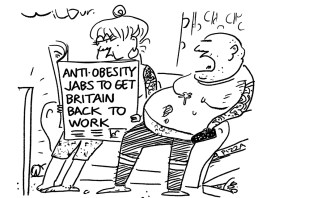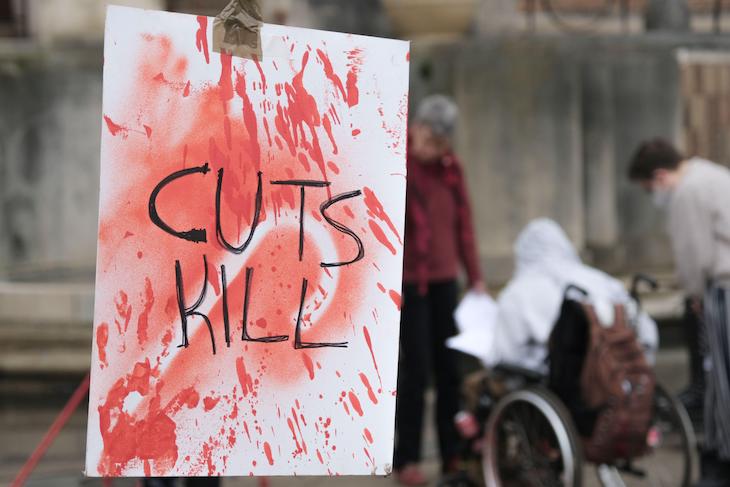What do we mean these days when we talk about the British ‘establishment’? When Henry Fairlie coined the term in 1955 – in The Spectator, of course – he defined it as ‘the whole matrix of official and social relations within which power is exercised’. A lot has changed in the past 70 years. The influence of the monarchy has diminished, the class system no longer holds sway, party politics is almost unrecognisable. Yet the idea of the establishment retains its powerful allure and, in the election of the next chancellor of Oxford University, we see how much it still matters to Britain’s 21st-century elite.
Dons complain of candidates inviting themselves to dinner or – worse – to address the college’s governing body
Some 38 candidates are now bidding to follow Cromwell, Wellington and Salisbury in taking up the chancellorship. The list of names was formally published this week but canvassing began in February when Chris Patten announced his retirement. Voting opens the week of 28 October and the top five face a second round in mid-November. ‘It’s gone on longer than the Tory leadership race,’ grumbles one academic.
Three peers lead the pack: William Hague, Peter Mandelson and Jan Royall. Each is deploying their political nous to best impress. Hague offers the gravitas, diplomacy and contacts book of one of Britain’s best-travelled foreign secretaries. Mandelson promises pragmatism and proximity to power. Royall, his one-time cabinet colleague, pitches herself as the candidate for welfare and widening access. She aims to build on her work at Somerville. Her efforts as principal have included championing unconscious bias training and purging octopus from college dinners.
The legal establishment is well-represented, too. Elish Angiolini, Scotland’s former lord advocate and head of St Hugh’s, is a favoured internal choice. There’s Margaret Casely-Hayford, the first black British woman to be made a partner at a City law firm. Dominic Grieve, the former attorney-general, could split the Tory vote, as might David ‘Two Brains’ Willetts. Major-General Alastair Bruce offers celebrity as a former historical adviser to Downton Abbey.
As in any British by-election, there are wildcards. These include an ‘anti-woke’ cleric and a socialist barrister who declared: ‘I’m not a politician, I haven’t invaded any Middle Eastern countries.’ But Imran Khan, the cricketer turned Pakistani premier, was disqualified – to the disappointment of followers who had been bombarding the Daily Mail with emails of support.
Active campaigning has traditionally been frowned upon. Contenders for the chancellorship presented themselves as ‘interested, not eager’, maintaining a lordly distance from proceedings. But the Corinthian spirit seems in short supply this year. Dons complain of candidates endlessly inviting themselves to dinner or – worse – to address the college’s governing body. ‘We can’t have that,’ sighs one. ‘It would only provoke an equal and opposite reaction from the others.’
But the election process itself has changed to better reflect Oxford’s modern global status. More than 250,000 graduates are eligible to vote, though estimates suggest only a fraction registered to do so. Once, Oxford chancellors were picked by MAs descending on the Sheldonian in their academic finery. Now, voting can be done any time, anywhere, at the simple press of a button. With such a vast unknown electorate, candidates have had to resort to glad-handing any grads still based in Oxford itself – namely, the long-suffering staff.
There are endless profiles and think pieces in the press, both local and national. Some prove inadvertently amusing. ‘What do you think is a right balance of modernity and tradition at Oxford?’ asked Cherwell. ‘The status quo,’ retorted Lady Angiolini. Others have their own political base. Mandelson wooed the Labour Club, whose co-chair hailed him as ‘unencumbered by ideological gripes’. Hague boasts the Tories and a campaign WhatsApp group while Roy-all is reliant on Somerville. ‘We couldn’t be prouder,’ enthused the college over the announcement, which had surprised Angiolini fans.
Voting is likely to cross party lines: arch-Brexiteer Daniel Hannan was backing Khan while Hague has fans among his New Labour sparring partners. A liberal-minded don describes him as ‘one of the more acceptable Tories to those of us who aren’t Tories’. But No. 10 suggests Keir Starmer – an Oxonian – is unlikely to be drawn on his preference.
Just like university undergraduates, candidates have submitted a personal statement of 750 words. These aim to show how each applicant envisages Oxford’s future over the next decade. Patten is the first chancellor not to die in post since 1715; his successor’s tenure is limited to ten years. It is a period likely to see major upheaval, not just for Oxford but the wider university model too. Artificial intelligence poses existential questions for the nature of academia. ‘We need a big strategic brain thinking about what the university looks like in ten years’ time,’ argues one don.

Oxford’s future lies as much in its newest college, Reuben – founded five years ago to focus on machine learning – as it does in its oldest, Balliol, half a mile away. Research comprises a third of the university’s £3 billion income, funding work on everything from fusion power and quantum computing to 6G tech and clinical trials. To keep its spot at the top of the world rankings, the new chancellor will need to upgrade Oxford’s financial firepower to withstand competition from America and the East.
Thinking and fundraising are two key parts of the role. A third is championing Oxford’s interests in the public sphere. Academic values are a key battle line here. Contenders are divided on the Higher Education (Freedom of Speech) Act, which Labour ministers have chosen to pause. Royall opposed the legislation while Hague backed it, prompting some to dub him ‘the free speech candidate.’
Then there is China. Mandelson has urged closer ties with Beijing and criticised the Tory ‘boycott’ of Hong Kong. Such views are anathema to Lord Patten, the last governor of the region. Both men disagree bitterly. Patten has ridiculed Mandelson’s call for a ‘Labour chancellor’ as ‘stupid.’ The Gaza conflict risks bubbling up again too as students return this week for Michaelmas term. Pro-Palestinian encampments previously sprung up across campus; navigating such tensions would test the skills of even the finest diplomats.
Unpaid, onerous and irksome: no wonder many academics shrink at the prospect of the post, which Roy Jenkins said was merely ‘impotence assuaged by magnificence’. Yet such is its magnificence that so many others are attracted to the role, fully aware of all the politics and pressures that it brings.








Comments